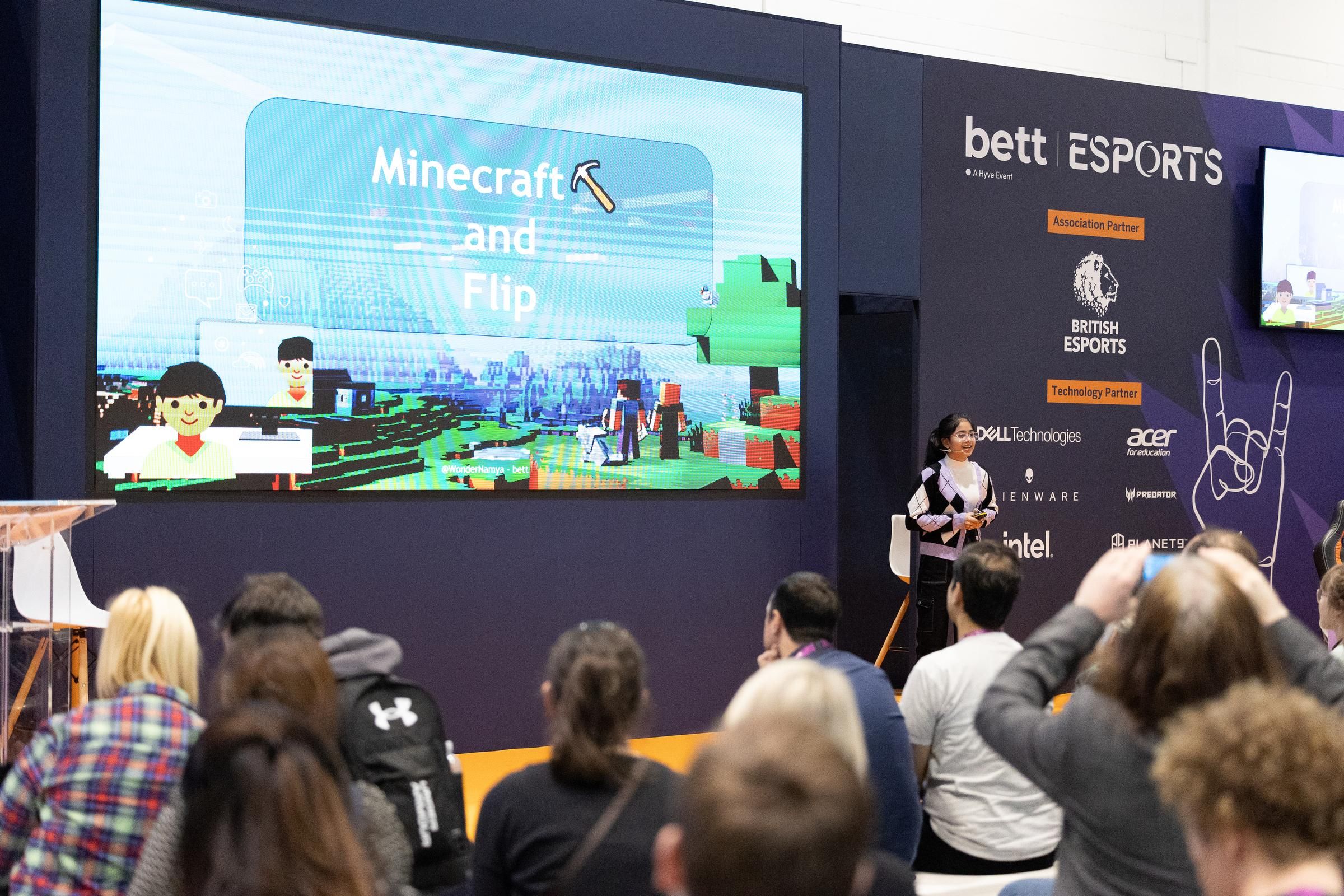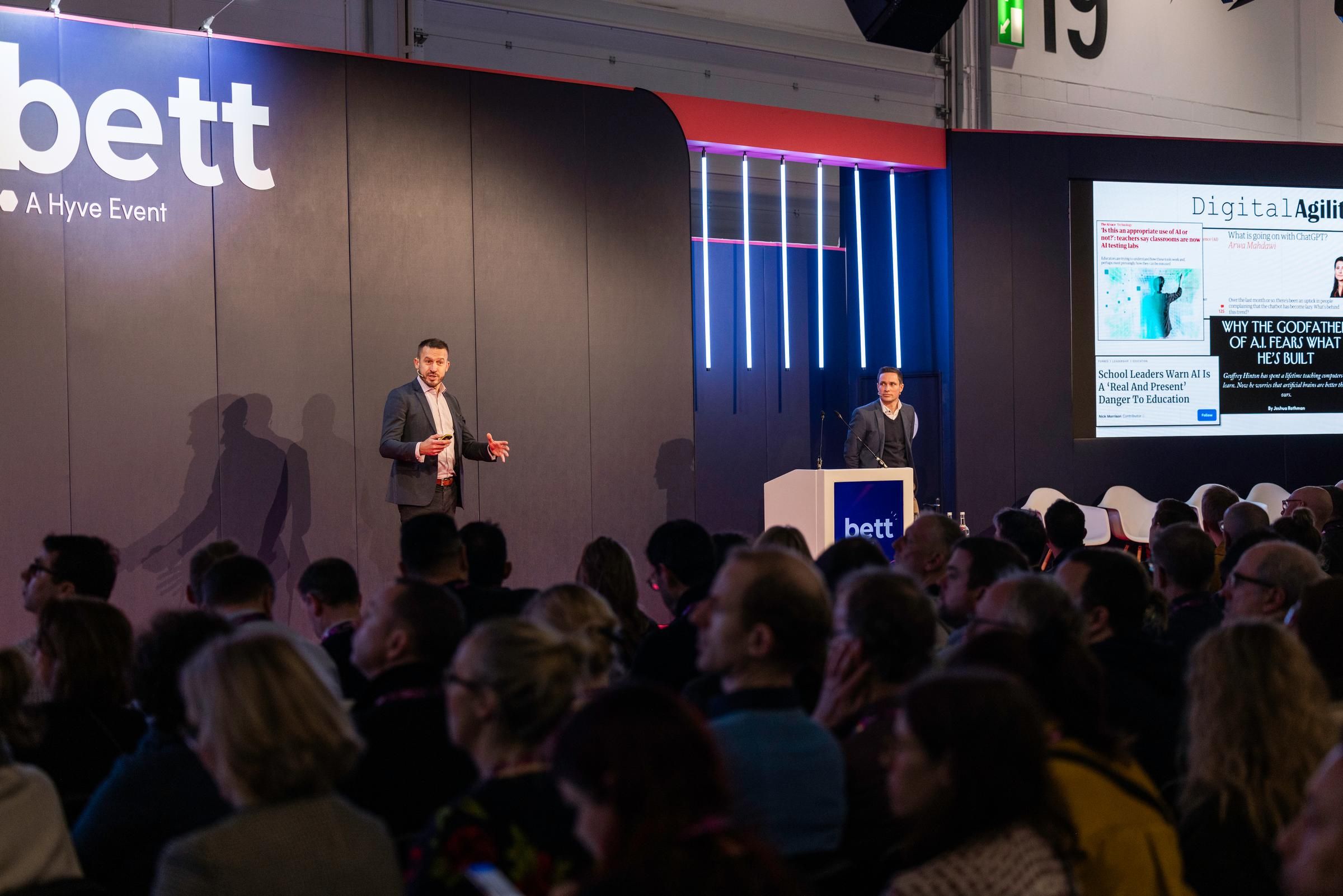4 key takeaways from Bett
)
Much like the education sector today, Bett UK 2024 was a sweeping, buzzing, exciting, and demanding three days. Over the course of the show, tens of thousands of education professionals met in London to explore the latest trends and biggest challenges in learning and teaching today.
Amidst the many streams, audiences and discussions at Bett UK 2024, some common threads of agreement emerged: placing people at the centre of technology; the place AI will have in the future of education; the vital importance of wellbeing in education and the need to prepare students for the future world of work.
Here are four main takeaways from Bett UK 2024:
Takeaway 1: Tech needs to be people-centred
“We don’t just believe in deploying technology, but ensuring the potential of the technology is unlocked.” - Francesco Corsini, EMEA Education Campaign Manager at Lenovo at Bett UK 2024

The event highlighted how crucial it is to focus on people when using technology in education. The best teaching tech isn’t a matter of software or hardware alone, but a combination of the right tools, prepared teachers, students with equitable access, and visionary administrators.
Namya Joshi, a 16-year-old student from India, has spent the last five years helping more than 15,000 teachers and young people globally to unlock the power of game-based learning, coding and STEM through Minecraft. In an interview at Bett 2024, Joshi spoke about how gamification is gaining recognition:
“Students learn better when it comes to games...when we see things, we learn better rather than just text-based learning,” said Joshi, explaining how she translates traditional lessons into a more compelling virtual world. “Students explore the environment, they learn the lesson, and then even the assessments are performed in the Minecraft game itself…we are not under pressure of getting marks, but actually excited to see the game.”
Technology can be far more than a tool for research or productivity. Vitally for students, it can help unleash creativity in learning and make sure all students can access the curriculum, no matter their background or abilities. Participants discussed using technology to support learners who struggle with overly stimulating pedagogical environments, or specific learning challenges across the spectrum.
Some highlighted the importance of not getting distracted by technology for technology’s sake, but ensuring EdTech was used to address real challenges, encourage learning and spark curiosity.
Donald Clark, learning tech entrepreneur, spoke onstage about the importance of understanding the difference been engagement for fun and engagement for impact, saying, “I hate the word ‘engagement’ in learning…I go to the Edinburgh Festival every year… I’m massively engaged every time! I love it! I can't remember a single joke. Not one. And that's because it's not about that type of fun engagement at all. It's a very serious business, learning.”
Overall, speakers stressed that putting people first in EdTech ensures it serves everyone equally and helps build a fair and supportive learning environment for all.
Takeaway 2: The question is not if AI will be a fixture in education. The question is how we should adapt.
“This genie is out of the bottle now. It’s there, our kids are using it, they’re all over it. So now we’re duty-bound to make sure they’re using it effectively.” - Ivan Langton, Head of Computing and Digital Literacy Coordinator, The Sultan's School at Bett UK 2024

AI changes everything (as one session at Bett was aptly named), and speakers from CEOs to teachers to policy leaders collectively addressed the inevitability of AI's presence and impact on education, focusing on the burning question of how to adapt to this transformative technology.
Discussions emphasised the need for responsible and ethical use of AI in learning, stressing the importance of good governance and policies to ensure inclusivity, privacy, and data protection.
Speakers highlighted AI's potential to personalise learning experiences, improve educational outcomes, and enhance student safety, while simultaneously acknowledging the challenges and concerns surrounding AI's impact on assessment methods and job readiness.
RGS Worcester took to the stage to show practically how the school had integrated AI into the curriculum, attracting over 400 participants, including representatives from the UK Government. Through real-world examples and insights, educators were encouraged to embrace AI literacy and skills development to prepare students for the AI-driven future. As the director of RGS Worcester stated, “The biggest threat of AI to education is to do nothing.”
Takeaway 3: Great schools are healthy schools
“The research is clear. You get happy teachers, you’re going to get happy kids, and that’s how you get happy outcomes.” - Ross McGill, Founder of TeacherToolkit at Bett UK 2024

With new skills to teach, new technology to grasp and integrate into lessons, changing societal expectations, resource shortages and students and institutions more connected than ever, educators are being pulled in several directions. As a result, there’s one essential question which is too easily overlooked:
How are students and their teachers doing?
Event sessions highlighted the bridge between school success and the wellbeing of teachers and students, demonstrating that for students to engage in lifelong learning, both they and their teachers must be physically and mentally healthy.
Participants and speakers alike discussed using technology to ease workload, the importance of addressing students' mental health, and creating comfortable learning environments. TableTalks provided a dedicated space for educators to share their own experiences managing the workloads and responsibilities of one of society’s most important careers.
By focusing on teacher and student wellbeing, the sessions emphasised the need for schools to support both academic and emotional needs, ultimately promoting a positive and thriving learning environment for all.
Takeaway 4: The future of work is changing, and education needs to follow suit.
“We have some open questions – what work will we do? What skills do we need to have? And last, but not least, how can we train ourselves and train people?” - Massimo Chiriatti, Chief Technology Officer at Lenovo at Bett UK 2024

At the pace technology is advancing and social structures are evolving, today’s educators must prepare students for future jobs which may not yet exist.
This requires deep and critical thinking about teaching methods, and the skills pupils pick up along their education journey. Alongside time-tested subjects, educators must consider skills like emotional regulation, communication, green skills, soft skills and technical know-how in an increasingly complex world.
Speakers at Bett UK – institution leaders, technologists, innovators among others – discussed the challenges facing teachers, and actionable steps for instructors and institutions to instil these critical skills in students. This ranged from introducing students to esports to teaching sustainability through STEM-based activities to fostering systems thinking.
Professor Jason Arday, Cambridge’s youngest-ever Black professor and a keynote speaker at Bett, has firsthand experience in overcoming immense challenges to build a successful career, and has advocated for using technology to prepare students of all backgrounds and learning styles for their futures.
In an interview with Teachers Talk Radio at Bett UK 2024, Arday said, “Society has become more complex, economically, politically...what we need to do as educators is give people that toolkit to be able to navigate a multicultural, multiethnic, multi diverse society.”
Beyond Bett 2024
Bett UK 2024 encapsulated the dynamic landscape of today’s education, showcasing a wide range of experiences, perspectives, innovations, and challenges. As we reflect on the discussions and insights shared, it's evident that the journey toward better learning outcomes for all is ongoing.
The themes that emerged – prioritising people-centric technology, grappling with the integration of AI, fostering holistic wellbeing, and preparing students for the evolving future of work – underscore the pressing need for continuous adaptation and innovation in education.
Looking ahead, Bett UK 2025 stands poised to build upon the foundation from previous years, delving deeper into these cutting-edge topics and offering educators a platform to engage with the leading minds in the field. Don’t miss your chance to help shape a brighter future for all students - register your interest today at bettshow.com.
Tags
- 2024
- 4
- ai
- bett
- challenges
- education
- educators
- engagement
- explore
- future
- highlighted
- importance
- joshi
- key
- latest
- learn
- learning
- more
- need
- one
- over
- people
- professionals
- re
- s
- skills
- speakers
- students
- takeaways
- teachers
- teaching
- tech
- technology
- uk
- using
- wellbeing


)
)
)
)
)
)
)
)
)